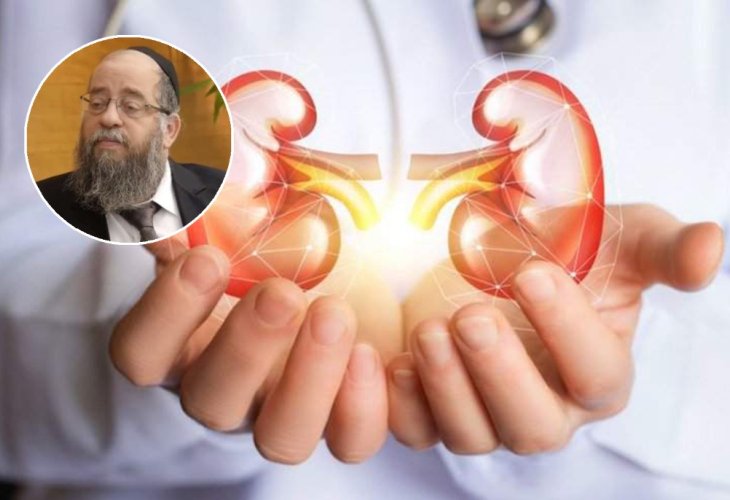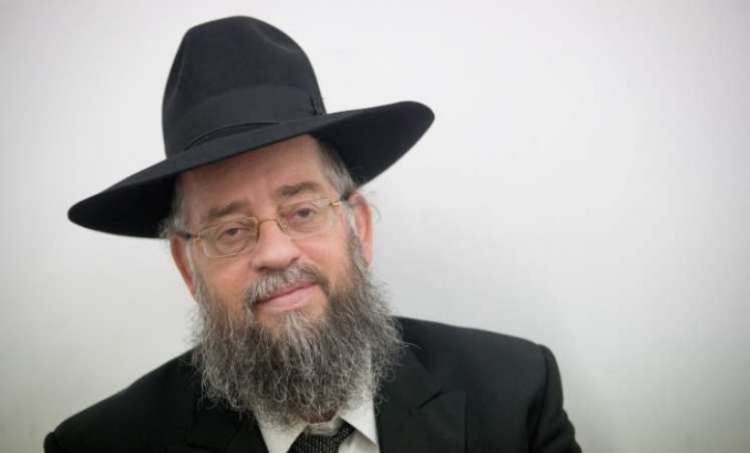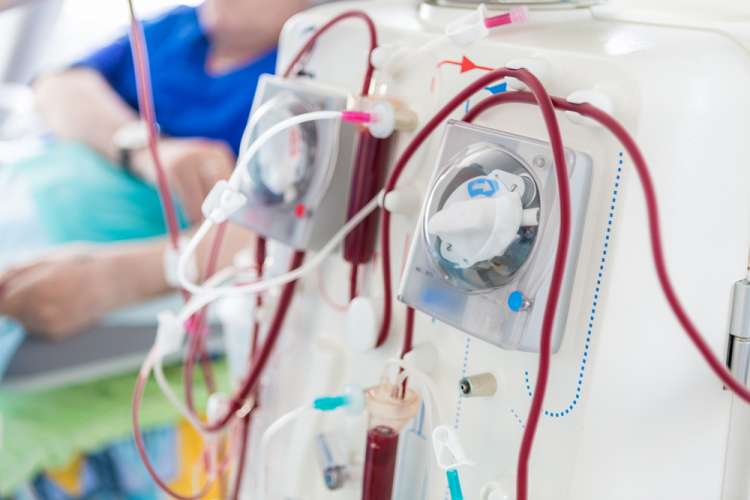"I Thought It Was PTSD. Who Would Want to Donate a Kidney? But Rabbi Haber Succeeded"
The widow of Rabbi Yeshayahu Haber z"l shares about his life, accomplishments, and last days. Others who knew him join her in mourning his passing.

On Thursday night, the first of Iyar, we lost Rabbi Avraham Yeshayahu Haber z"l, founder of the "Gift of Life" organization, which has helped around 820 kidney patients receive altruistic kidney donations. His death shocked not only the recipients and donors who relied on him so much but also many others. Despite the specific niche he worked in, Rabbi Haber's name was well-known in many homes, mainly because of the "Gift of Life" booklets distributed throughout the country, featuring stories of donors and recipients—stories that moved many, who in turn became donors themselves.
Last weekend, "Israel Hayom" published an extensive article on Rabbi Haber's work, including an interview with his widow, Rebbetzin Rachel Haber.
Rebbetzin Haber shared that she married Rabbi Haber at only 19, after just one meeting. "If you had asked me at 19, when we met, if I would marry Yeshayahu even though he would be taken from me at 55, I would have answered, 'Of course!' without hesitation," she said in the interview.
Rebbetzin Haber recounted her late husband's life story and the unique path he took that led him to become a recognized figure, a supporter, influencer, and lifesaver.
 (Photo: Yonatan Sindel/Flash90)
(Photo: Yonatan Sindel/Flash90)
"Pinchas' Death Was the Birthday of 'Gift of Life'"
At the beginning, the Haber couple lived a calm life. Rabbi Haber was a teacher in a yeshiva, a school principal, and an advisor in various fields, and he was completely healthy. In 2008, however, he began feeling increasingly weak until he had to go to the hospital, where it was discovered that his kidneys had failed. He urgently needed dialysis. "Only then did he call me and said, 'I'm on dialysis,'" recounted his widow. "I had never heard the word before. I said to him, 'We don't have an Aunt Aliza'"... Rebbetzin Haber mentioned that her husband never allowed her to be with him during dialysis because he didn’t want her to suffer seeing him suffer.
During the time he was undergoing dialysis, Rabbi Haber met a 19-year-old named Pinchas, who had a kidney transplant as a child. Pinchas' parents were bereaved; their soldier son was killed by a sniper. Apparently, during the mourning period, Pinchas forgot to take his regular medications, causing his condition to deteriorate and requiring dialysis again. They formed a close and strong connection. When a friend of Rabbi Haber was found to be a match for a kidney donation, Pinchas pleaded with his new friend to help him find a kidney too.
Indeed, only six weeks after Rabbi Haber successfully underwent a kidney transplant, he vigorously worked to find one for Pinchas. He posted handwritten notices in synagogues, stating, "Looking for a kidney for a bereaved brother." Eventually, the efforts succeeded—a man from Netanya was found suitable to donate. However, shortly before the surgery, Pinchas suffered cardiac arrest and passed away. "The day of his death was the birthday of 'Gift of Life'," says Rebbetzin Rachel Haber. "That's when my husband committed that no one should die on dialysis again. He left everything and dedicated his life to rescuing people from this terrible place."
Rebbetzin Haber herself was surprised by Rabbi Haber's new initiative, initially thinking it was madness or PTSD following Pinchas' death. But Rabbi Haber z"l threw himself into the project with full force. He established a foundation and began publicizing it, gradually attracting patients in need of kidneys, and eventually potential donors. "In the first year, he managed to coordinate four altruistic transplants. We thought we had reached Everest. In the second year, there were eleven, and now we've reached 140 transplants a year." Amazing.
Through "Gift of Life", 820 people received a new kidney and a new life. And it's not over. More than 100 volunteers are currently in the process of kidney donation, and many others continue to inquire about the process and donation options, even after Rabbi Haber's passing.
Rebbetzin Haber states that Rabbi Haber never personally persuaded anyone to donate a kidney. He provided information and raised awareness, and the donors came forward. He even received the support of major rabbis who also allowed him to be interviewed on any possible platform to promote the cause. Over time, his wife decided not only not to interfere but also to assist actively. The couple personally met every donor and recipient "to witness the miracle," as she put it. She also supported female donors and recipients who sometimes felt more comfortable speaking with a woman and translated some of his lectures and publications into English.
 (Illustrative photo: Shutterstock)
(Illustrative photo: Shutterstock)
"I am in isolation, but not alone"
When the coronavirus pandemic began to gain momentum, Rabbi Haber z"l decided to quarantine himself at home. He knew that kidney transplant recipients are at very high risk if exposed to COVID-19, and thus, even before any official guidelines were issued, he made great efforts to protect himself. He canceled meetings with people, while simultaneously sending messages to kidney transplant recipients in all groups, warning them to protect themselves. "He used to say, 'I am in isolation, but not alone,'" recounts the Rebbetzin. However, it seems one household member contracted the virus despite all precautions, and Rabbi Haber himself was infected. The Rebbetzin doesn't trouble herself with how exactly he contracted it. She repeatedly says it was all from Heaven, sent specifically for him. Initially, there was no suspicion of COVID-19 because the symptoms were slightly different, but a test was still taken. By the time the test results arrived, Rabbi Haber was already in the ambulance on the way to the hospital. His condition deteriorated all at once during Passover's intermediate days, and he was taken for treatment at the hospital.
"We called for an ambulance and told them we had been tested for COVID-19, but no results yet. Immediately a vehicle arrived with a paramedic covered completely in white protective gear. Through the mask, he said, 'Rebbetzin! It's me, Chaim Neuman from Hebron.'" He was one of the kidney donors through "Gift of Life".
Chaim Neuman, a Magen David Adom volunteer and kidney donor, became active in the "Gift of Life" association and a close associate of Rabbi Haber z"l after his kidney donation. In an interview, he recounts the moment he received the call to Rabbi Haber's home. "The call was marked 'urgent.' Suddenly I realized what was written there, 'Haber family, kidney transplant recipient, suspected of COVID.' I knew the address well since I had been there before. Everything clicked for me at once. I rushed towards the house with the siren on and it took me just five minutes to get there.
"When we lowered him into the ambulance, his deterioration was very rapid, and I had to connect him to oxygen. Then he stabilized and regained consciousness. He spoke to me and the medic and said, in his humble way, 'Thank you very much, I am in awe of the medical team and apologize for the trouble.' This was so typical of him."
At the hospital, when Rabbi Haber was transferred to the COVID department, Neuman found it hard to disconnect from him and, being well-protected, hugged the Rabbi. "I told him, 'Rabbi, we still have a waiting list for kidney donations to clear. We all need you, stay strong and healthy... all your merits will stand for you, there's no way you won't come out healthy.' The Rabbi replied, 'Chaim, I love you so much.'"
That evening, Rabbi Haber called his wife asking her to consult with his regular doctors, as the doctors in Hadassah wanted to sedate and ventilate him. She consulted and returned with a positive answer, only to discover that in the meantime, he had already been sedated. That call became their last conversation.
"The medical staff fought for him emotionally. In these terrifying days, it's so important to thank these angels from Hadassah, who did not give up for a moment... they knew how hard it was for us that he was there alone, without us, and they were our messengers," says Rebbetzin Rachel.
 (Photo: Shutterstock)
(Photo: Shutterstock)
"The Donors Worry—How Will They Manage? Who Will They Consult?"
At the funeral, held in a limited format due to Ministry of Health guidelines, Rabbi Haber's son eulogized him through a radio in the ambulance, as the entire family had also contracted COVID-19. It's hard to remain indifferent to the stories shared by his family and those who knew him. "Every soul completes its task in the world and reaches its rightful place in the higher world," says his father, Rabbi Tzvi Haber, "and this thought comforts me, but it does not stop the tears from flowing. I sit with my wife and we both cry. I said 'Kaddish' for my son, instead of him saying 'Kaddish' for me. I had a son, and I no longer have him. Thank God, we have other children to be happy with, but Shaya was the gem in our crown. Loved people and was beloved by others."
Rachel Mikhovich, the transplant coordinator at Beilinson Hospital, who had known Rabbi Haber closely for the last 13 years, describes him: "He was a person with the highest emotional intelligence I've ever met... I was amazed to discover how knowledgeable he was in so many fields. Quite a few donors have been calling me in recent days," she adds, "Like me, they too are afraid of what's going to happen now. They are connected to him in different strengths, they ask how they will manage? Who will they consult with?"
Rebbetzin intends to continue Rabbi Haber z"l's path, for which she received special approval from Rabbi Kanievsky shlit"a. "I hope I have the inner strength," she says about this. "This is my life's mission now. Fortunately, the Rabbi knew how to elevate everyone around him... I now have to measure a pair of big shoes, and perhaps add some insoles, but eventually, I will run."
"Rabbi Haber always said that not everyone needs or can donate a kidney, but everyone can and should do a small kindness for someone around them," she adds. You can lend a listening ear, offer a compassionate heart, or extend a helping hand. You can give a kind word, a smile. What a smile he had. This is his legacy, and this is what I am committed to continue from now on."

